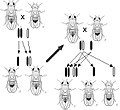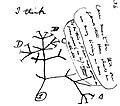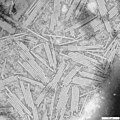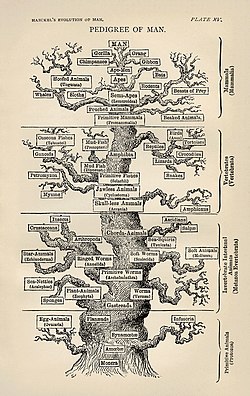Portal:Biology
Introduction


Biology is the scientific study of life and living organisms. It is a broad natural science that encompasses a wide range of fields and unifying principles that explain the structure, function, growth, origin, evolution, and distribution of life. Central to biology are five fundamental themes: the cell as the basic unit of life, genes and heredity as the basis of inheritance, evolution as the driver of biological diversity, energy transformation for sustaining life processes, and the maintenance of internal stability (homeostasis).
Biology examines life across multiple levels of organization, from molecules and cells to organisms, populations, and ecosystems. Subdisciplines include molecular biology, physiology, ecology, evolutionary biology, developmental biology, and systematics, among others. Each of these fields applies a range of methods to investigate biological phenomena, including observation, experimentation, and mathematical modeling. Modern biology is grounded in the theory of evolution by natural selection, first articulated by Charles Darwin, and in the molecular understanding of genes encoded in DNA. The discovery of the structure of DNA and advances in molecular genetics have transformed many areas of biology, leading to applications in medicine, agriculture, biotechnology, and environmental science.
Life on Earth is believed to have originated over 3.7 billion years ago. Today, it includes a vast diversity of organisms—from single-celled archaea and bacteria to complex multicellular plants, fungi, and animals. Biologists classify organisms based on shared characteristics and evolutionary relationships, using taxonomic and phylogenetic frameworks. These organisms interact with each other and with their environments in ecosystems, where they play roles in energy flow and nutrient cycling. As a constantly evolving field, biology incorporates new discoveries and technologies that enhance the understanding of life and its processes, while contributing to solutions for challenges such as disease, climate change, and biodiversity loss. (Full article...)
Selected article -

In biology and medicine, a host is a larger organism that harbours a smaller organism; whether a parasitic, a mutualistic, or a commensalist guest (symbiont). The guest is typically provided with nourishment and shelter. Examples include animals playing host to parasitic worms (e.g. nematodes), cells harbouring pathogenic (disease-causing) viruses, or a bean plant hosting mutualistic (helpful) nitrogen-fixing bacteria. More specifically in botany, a host plant supplies food resources to micropredators, which have an evolutionarily stable relationship with their hosts similar to ectoparasitism. The host range is the collection of hosts that an organism can use as a partner. (Full article...)
Selected picture -

The Warbler Finch (Certhidea olivacea) is the only member of the genus Certhidea and one of Darwin's finches, the group of 14 or 15 passerine birds first collected by Charles Darwin on the Galápagos Islands during the second voyage of the Beagle. Though sometimes classified in the family Emberizidae, more recent studies have shown it to belong in the tanager family, Thraupidae. Darwin had mistakenly thought it was a wren, but, on return to England, was informed in March 1837 by the ornithologist John Gould that the bird belonged to the group of finches.
Major topics
Selected biography -
Linus Carl Pauling FRS (/ˈpɔːlɪŋ/ PAW-ling; February 28, 1901 – August 19, 1994) was an American chemist, biochemist, chemical engineer, peace activist, author, and educator. He published more than 1,200 papers and books, of which about 850 dealt with scientific topics. New Scientist called him one of the 20 greatest scientists of all time. For his scientific work, Pauling was awarded the Nobel Prize in Chemistry in 1954. For his peace activism, he was awarded the Nobel Peace Prize in 1962. He is one of five people to have won more than one Nobel Prize (the others being Marie Curie, John Bardeen, Frederick Sanger, and Karl Barry Sharpless). Of these, he is the only person to have been awarded two unshared Nobel Prizes, and one of two people to be awarded Nobel Prizes in different fields, the other being Marie Curie.
Pauling was one of the founders of the fields of quantum chemistry and molecular biology. His contributions to the theory of the chemical bond include the concept of orbital hybridisation and the first accurate scale of electronegativities of the elements. Pauling also worked on the structures of biological molecules, and showed the importance of the alpha helix and beta sheet in protein secondary structure. Pauling's approach combined methods and results from X-ray crystallography, molecular model building, and quantum chemistry. His discoveries inspired the work of Rosalind Franklin, James Watson, Francis Crick, and Maurice Wilkins on the structure of DNA, which in turn made it possible for geneticists to crack the DNA code of all organisms. (Full article...)
General images -
Did you know -
- ... that seeds of the fossil fruit Suciacarpa have fossil fungi inside them?
- ... that the fossil ant genus Agastomyrma was described from a single queen, and males of the fossil ant Proceratium eocenicum have a hair fringe?
- ... that less than 50 years after being discovered, Heterelmis stephani is now presumed extinct?
- ... that in 1981 Bobbi Campbell became the first person to publicly identify as a person living with HIV/AIDS?
Things you can do
Related portals
Biology portals
Categories

Anatomy - Anthropology - Astrobiology - Biochemistry - Bioengineering - Bioinformatics - Biotechnology - Botany - Cell biology - Conservation biology - Developmental biology - Ecology - Environmental science - Evolutionary biology - Genetics - Mathematical biology - Medicine - Microbiology - Immunology - Molecular biology - Mycology - Neuroscience - Paleontology - Palynology Parasitology - Pharmacology -
Phylogenetics - Physiology - Systems biology - Taxonomy - Toxicology - Virology - ZoologyMore topics
WikiProjects

WikiProjects connected with biology:
A complete list of scientific WikiProjects can be found here. See also Wikispecies, a Wikimedia project dedicated to classification of biological species.
Associated Wikimedia
The following Wikimedia Foundation sister projects provide more on this subject:
-
Commons
Free media repository -
Wikibooks
Free textbooks and manuals -
Wikidata
Free knowledge base -
Wikinews
Free-content news -
Wikiquote
Collection of quotations -
Wikisource
Free-content library -
Wikiversity
Free learning tools -
Wiktionary
Dictionary and thesaurus


























































